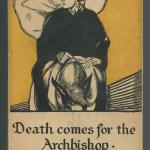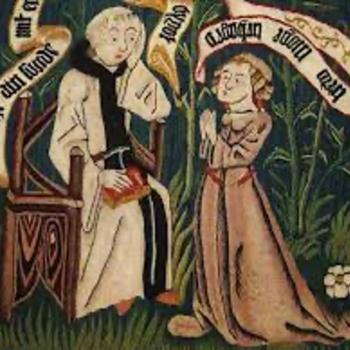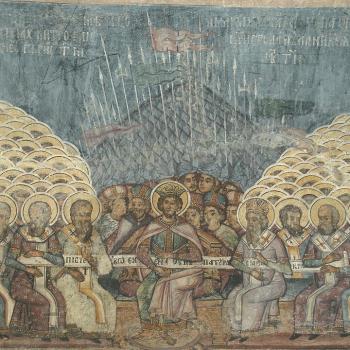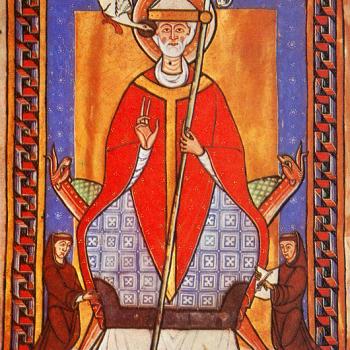The famous defender of orthodox faith, Basil of Caesarea, wrote a theologian early in his career asking for advice on how to understand trinitarian relations. He concludes the letter, “In good health may you be preserved to us for the longest while, giving aid to us both by your prayers and by your knowledge” (Basil, Epistle 361). While the content of this letter is honest, earnest, and straightforward, it has caused a great deal of controversy for scholars of the early church, many of whom deny its authenticity. The problem is not what is found in the letter, but the recipient: Apollinarius of Laodicea, the notorious heretic from the fourth century. How could a hero of the faith ask a heretic for advice?
Apollinarius the Christological Heretic
Apollinarius is primarily known in the history of Christian theology for his denial of a human mind in Christ, for which he was eventually condemned in 377. Essentially, he argues that the eternal Son takes the place of the human intellect (which is understood as either the soul or mind) of Christ when he becomes incarnate, what my colleague has referred to as a ‘God in a bod’ heresy. Apollinarius writes, “If together with God, who is intellect, there was also a human intellect in Christ, then the work of the incarnation is not accomplished in him” (Apollinarius, Fragment 74). While there are several potential motivators for Apollinarius’ system on this point, it is sufficient to say that this view was universally rejected in the church. Unsurprisingly, most early patristic scholars had not looked too deeply into Apollinarius’ life and theology, particularly as he seems to be a fringe character on account of his condemnation. But, in the late 20th century, some historical theologians started to take a closer look at him and were surprised by what they found.
Apollinarius the Orthodox Trinitarian?
For those reading through Apollinarius’ trinitarian works, particularly Exposition of Faith, something shocking rises to the fore—Apollinarius’ trinitarian theology is orthodox, insofar as he holds to the single essence in the Godhead, the eternal distinctions of Father, Son, and Spirit, and seeks to conform to the council of Nicaea (325). Further, he makes significant developments in how to understand this doctrine. Kelley McCarthy Spoerl has led the charge in arguing that his trinitarian theology is perhaps the first to combine the language of ‘essence’ with insights from Eusebius of Caesarea and the anti-marcellan tradition on the triune ‘persons’. That is to say, the ‘so-called’ Cappadocian settlement of ‘one essence in three persons’ may have come from Apollinarius himself. This, according to Peter Gemeinhardt, may have even influenced one of the greatest trinitarian writers of the west: Augustine. Whether his theology did influence Augustine and the Cappadocians is beyond the scope of this post, but it does make one thing clear: Apollinarius’ trinitarian theology is orthodox and influential.
This, then, contextualizes another unexpected fact about him: he is friends with several orthodox writers. He converses with a young Basil of Caesarea positively and entered into communion with Athanasius of Alexandria. This friendship with Athanasius has him cast out of his native church in Laodicea, who looked upon Athanasius suspiciously for his trinitarian doctrine and his anti-Eusebian writings (Sozemen, Ecclesiastical History 6.25). He was even an ally of Damasus, the bishop of Rome from 366 to 384, who eventually condemned him for heresy. It seems that Apollinarius’ trinitarian theology was attractive to these early writers, who viewed him as an ally in their efforts to subvert Arianism and Eunomianism, which are trinitarian heresies from this period.
Can Orthodoxy Hide Heresy?
My point here is not to get into the weeds of trinitarian doctrine in the fourth century, but to speak to the historical and theological complexity surrounding the legacy of someone like Apollinarius. There was clearly a time in his career when he was aligned with important theological figures and his trinitarian doctrine was hugely influential. This, in turn, may have even allowed some of his Christological views to spread unchecked for a period. How could these theologians have been so blind to Apollinarius’ heresy?
This is, once again, a complicated answer: perhaps they simply didn’t know about it. That might be the easiest pill to swallow! Or perhaps this might be chalked up to a lesson on what we center in our theology and faith. For someone like Athanasius or Basil, an orthodox articulation of the Trinity was hugely important, particularly as they were both in active debates about it. But Christology was not on the fore in most of their discussions, and thus they were simply blind to his views or didn’t stop to ask further questions of Apollinarius about it.
Putting on Blinders: Mark Driscoll and the Evangelical ‘Center’
As evangelicals, we might pause to reflect on what is the at the center of our current church milieu. What is held to be the most important factor in our allegiances or the promotion of certain thinkers? Is it the creative articulation of the ‘Gospel’? Is it found in those who are speaking well about marriage and sexuality, race or gender? I don’t want to deny that these are important things to center, but we must also realize that just because someone says or defends the ‘right’ thing about a central tenant of evangelical faith doesn’t mean we can be blind to other aspects of their lives or theology.
This may contextualize—though certainly not fully explain—why we are sometimes slow to critique or condemn certain evangelical leaders who are showing theological or character issues. Take Mark Driscoll, for example. He was a writer for one of the most influential evangelical blogs, The Gospel Coalition, had his books endorsed by other ‘orthodox’ evangelical leaders, and pastored one of the largest churches in North America. But despite controversy and growing allegations of abuse, many came to his aid or brushed away criticism (this episode of The Rise and Fall of Mars Hill gets into some of this). Why is that? Is it simply because they were not aware of the issues behind the scenes? Perhaps, although one peek into his book Real Marriage (endorsed by Wayne Grudem and Andy Stanley, amongst others) or some of his other writings makes this a difficult argument to hold up. Maybe, just maybe, Driscoll was an influential ally for many evangelicals, which blinded them to the issues at Mars Hill—and even allowed him to rise to leadership once again.
If these fourth century church fathers give us a lesson in overlooking heresy because of ‘centered’ orthodoxy, we also have a lesson in upholding the truth when issues become clear. Apollinarius’ friendships were all early alliances—he is later rejected by these theologians for his heterodox Christology. So, Basil writes, “For in truth we have found much distress among all who cling to the peace of the Lord at the manifold innovations of Apollinarius of Laodicea, who has distressed us so much the more in that in the beginning he seemed to be one of us” (Basil, Epistle 265). This clearly appears to be a painful experience for Basil, as Apollinarius appeared to be a true ally. But he doesn’t let this friendship perpetuate bad teaching—he condemns him and seeks friendship elsewhere. Just because a leader rises to prominence in the church doesn’t mean they should stay there, even if there might be a shared set of ‘core’ beliefs. Further, we must be critical of what we center and make sure it doesn’t blind us to other aspects of doctrine or righteous living, as in the case of Apollinarius and Mark Driscoll respectively. What we center theologically should allow for growth and truth, not blind us to abuse or heresy.













